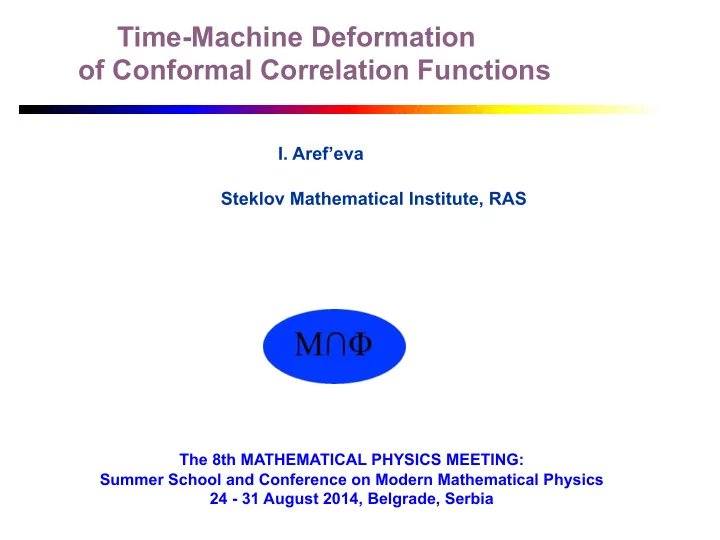

Time-Machine Deformation of Conformal Correlation Functions ¡ ¡ ¡ ¡ ¡ ¡ ¡ ¡ ¡ ¡ ¡ ¡ ¡ ¡ ¡ ¡ ¡ ¡ ¡ ¡ ¡ ¡ ¡ ¡ ¡ ¡ ¡ ¡ I. Aref’eva Steklov Mathematical Institute, RAS The 8th MATHEMATICAL PHYSICS MEETING: Summer School and Conference on Modern Mathematical Physics 24 - 31 August 2014, Belgrade, Serbia
Plan ¡ • I. ¡Introduc+on. ¡ ¡(Reminder ¡from ¡previous ¡talk: ¡Holographic ¡Models ¡of ¡QGP ¡forma+on) ¡ • A. Shock waves collisions in AdS5 • ¡ ¡ ¡ ¡ ¡ ¡ ¡ ¡ ¡ ¡ ¡ ¡ ¡B. ¡ ¡Infalling ¡ ¡shell ¡ ¡ • ¡ ¡ ¡ ¡ ¡ ¡ ¡ ¡ ¡ ¡ ¡ ¡ ¡C. ¡ ¡ ¡3-‑dim ¡toy ¡model ¡ • ¡II. ¡3 ¡-‑dim ¡toy ¡models ¡ ¡ ¡ ¡ ¡ ¡ ¡ ¡ ¡ ¡ ¡ ¡ ¡ ¡ ¡Ultrarela+vis+c ¡par+cles ¡ ¡ ¡ ¡ ¡ ¡ ¡ ¡ ¡ ¡ ¡ ¡ ¡ ¡ ¡ ¡ ¡ ¡ ¡ ¡ ¡ ¡ ¡ ¡ ¡ ¡ ¡ ¡ ¡Time-‑machine ¡ ¡ with A.Bagrov ¡ ¡ ¡ ¡ ¡ ¡ ¡ ¡ ¡ ¡ ¡ ¡ ¡ ¡
Introduction. B. Infalling shell as holographic model of thermalization ¡ ¡ d+1-‑dimensional ¡infalling ¡shell ¡geometry ¡is ¡described ¡in ¡Poincar'e ¡ coordinates ¡by ¡the ¡Vaidya ¡metric ¡ ¡ Danielsson, ¡Keski-‑Vakkuri ¡and ¡ ¡Kruczenski ¡ 1) ¡ 2) ¡ Thermalization time
Thermaliza+on ¡with ¡Vadya ¡AdS ¡
Introduction. B. Infalling shell as holographic model of thermalization • Thermalization time dependence on • chemical potential ( ch.pot. decreases thermalization time ?) • anizotropy • non-centricity Centrality independence of thermalization time in Vaidya approximation (3D) IA, Bagrov,Koshelev, JHEP (2013) Question: can trust to infalling shell estimations
Model example: colliding particles in AdS 3 (main part of the talk)
Stationary Particles in Ad 3 М (1,2) ‘t Hooft, Deser, Jackiw, 1983 Particles are described by the angle deficit
AdS 3 in Global Coordinates AdS ~ SL ( 2 , R ) 3 1 2 1 1 ds AdS Tr(x d x x d x) − − = 2 2 1 +
AdS 2+1 2-point correlation function
Correlators for Particles in AdS 3 Section of cylinder with a particle l ln( L ) = AB AB L AB L AB * l O ( A ) O ( B ) ~ e − Δ ANSWER! < > min Δ Δ
Two geodesic approximation for equal time correlation functions ∆ = 3 ∆ = 1
2-point correlation functions on S 1 xR 1 dual to AdS 3 with stationary particle at the center Geodesics with winding
2-point correlation functions on S 1 xR 1 dual to AdS 3 with stationary particle at the center The angle deficit = π G ( p , r , ) π =
Ultrarela+vis+c ¡par+cles ¡ On the boundary t=t* Matschull,9809087
Two particles Hourglass n>2 container with flexible walls
Container with flexible wall
Appearance of the trapped surface t t therm
2-point functions dual to AdS 3 with a massive moving ¡ particles Particle moving along the spiral
Moving ¡par+cle ¡(along ¡a ¡spiral) ¡ ¡ ¡ y ¡
2-point correlation functions on S 1 xR 1 dual to AdS 3 with moving particle G ( p , r , *, t *) ϕ =
Two particles. Increasing angle (mass)
Two particles. Increasing Lorentz parameter.
Time evolution
GoR’s ¡+me ¡machine ¡ TM will be produced by two idenitical particles when the sum of their deficit angles is more or equal to 2 π
Boundary ¡of ¡the ¡GoR ¡Time ¡Machine ¡
Correlation functions on the boundary of Gott’s TM τ = 0 φ = 0
Inverse correlation functions
2-point Correlation Functions
The causal picture of the boundary of the spacetime with 2 moving massive particle The deficit angle is taken to be less then π ( − 2 π , π ) ( ο , π ) (2 π , π ) τ 2 τ 1 (2 π , −π ) (0, −π ) ( − 2 π , −π ) The area remaining after the cut-and-glue procedure (living space) is surrounded by the green parallelepiped The light blue squares original poles of the Green function The marine squares additional poles of the Green function
Number of zeros of the inverse propagator No dark regions Dark regions
Conclusion Holographic Models of QGP formation A. Shock waves collisions in AdS5 B. Infalling shell C. 3-dim toy examples Main achievements: 0.15 S s ∝ A. Multiplicity data NN B. Thermalization time C. Conformal symmetry breaking produces infinite number of excitations
Recommend
More recommend